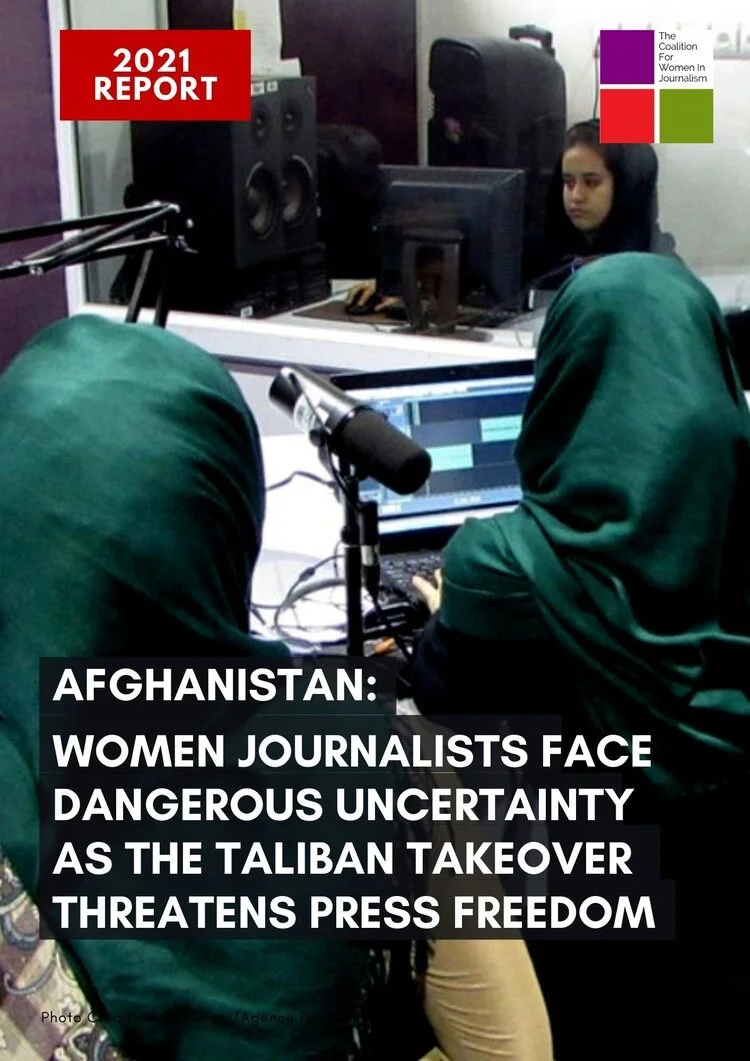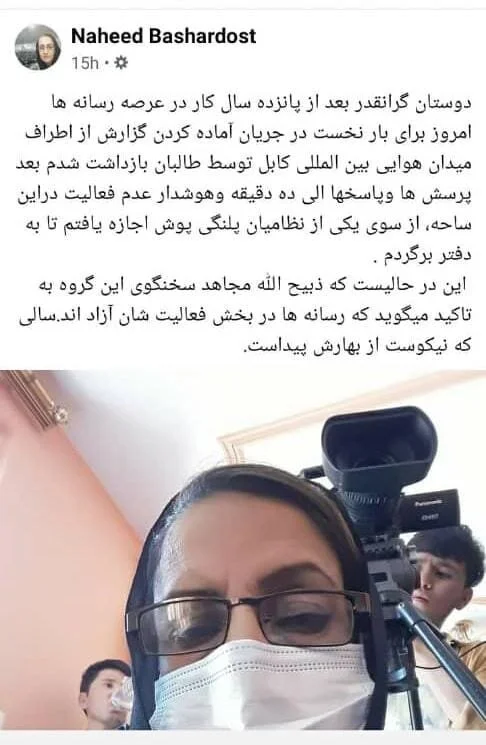Afghanistan: Women Journalists Face Dangerous Uncertainty as The Taliban Takeover Threatens Press Freedom
Hope is dwindling fast for Afghan women journalists desperately trying to flee the country.
The Taliban takeover has crushed the dreams women have been working towards for the last two decades. The brave and resilient journalists risked their lives over the years to report the war crisis and Taliban atrocities. They have shown courage when faced with fear, intimidation, and threats. A tragic number of these journalists lost their lives, were severely injured in attacks, or were threatened with violence. Taliban spokesman, Zabilullah Mujahid, announced a committee would be created to investigate issues of the media, but past incidents still haunt women journalists and human rights activists. Several have reported intimidation and threats under the Taliban's regime.
The Coalition For Women In Journalism continues to amplify Afghan journalists and activists through our platform and social media campaigns. We have reported several cases anonymously to highlight the plight of Afghan women journalists who are stuck in this crisis. Khadija Ashrafi, general manager of Bakhtar News Agency, is one of the latest victims of the Taliban's aggression. The Taliban broke into her house on August 17, but luckily she was not home. She had relocated earlier and did not know if the Taliban seized anything from her home.
Award-winning journalist Maryam Mehtar shared on Twitter, "My friends have been staying at safe houses and guest houses in Kabul for a month before being transferred to another country. Students go from house to house behind them. Please tell your friends and acquaintances who went to the airport without any documents not to lose the right to return to their lives.”
دوستانم یک ماه و حتی بیشتر از یک ماه شده که در مهمانخانه ها و خانههای امن کابل به سر میبرند تا به کشور دیگری منتقل شوند. طالب خانه به خانه پشت آنها میگردند.
— MarYam MeHtar (Nabavi) (@MaryamMehtar) August 22, 2021
لطفا به دوستان و آشنایانتان که بدون هیچ سندی میدان هوایی رفتهاند بگویید حق تلفی نکنند برگردند به زندگیشان.
Kabul airport is in chaos as thousands of people, including journalists, activists, and human rights defenders, look for an opportunity to flee the country alive. Filmmaker and writer Sahraa Karimi, who has safely reached Ukraine after receiving assistance, also shared on Twitter, "Taliban went to #Afghan-film two days ago and searched the whole building. They took the key to the office building and did not allow anyone to work. I have observed the administrative levels and taken a leave for more assurance, and during my vacation, I still manage my office remotely." Sahraa has also shared the heartbreaking pictures of destroyed arts and craft pieces that artists have broken themselves as they anticipate the Taliban's retaliation.
My heart shatters to see and talk to Afghan artists who have started destroying their own art out of fear. #Afghanistan is becoming black and white again. It’s losing its beauty, diversity and colors. I am afraid the world will let this happen again! https://t.co/9rQ9lsF7yI
— Sahraa Karimi/ صحرا كريمي (@sahraakarimi) August 26, 2021
Another prominent woman journalist and senior correspondent at Pajhwok Afghan News, Naheed Bashardost was detained by the Taliban at the Kabul airport. Naheed was there to cover the stories of people stuck at the airport when she was confronted by members of the Taliban who questioned her presence and told her to go directly home. They warned her against working as a journalist.
Taliban spokesman, Zabilullah Mujahid, announced in his second press conference the formation of a committee to look into the issues of media organizations. He accepted that "maybe there are incidents, small incidents. Maybe some of our fighters are near your offices. We will be moving them from the media houses so you can work freely." He emphasized that women journalists should not be scared as they are civilians, and there is no crime in being a journalist.
However, the reality is far from what Zabilullah Mujahid has assured. Journalists working on the ground and in offices may not come forward, but they have been anonymously reporting intimidation and threats. World leaders must unify efforts to better help the vulnerable people desperate to escape the Taliban’s rule.
Tears on the tarmac as Afghan journalist speaks to BBC
— Sana Safi ثنا ساپۍ (@BBCSanaSafi) August 25, 2021
"I love my country, but I cannot stay here," Wahida Faizi told the BBC's Lyse Doucet in Kabul.https://t.co/PsvUbNW1A2 via @BBCNews
Wahida Faizi, an Afghan journalist, gave an emotional interview to Lyse Doucet at Kabul airport as she prepared to leave. She said while crying, "They didn't know me. Now if they know me, I believe they will kill me. I must leave my country. I can't live here."
As The Coalition For Women In Journalism continues to raise Afghan women journalists' voices and concerns, we demand the United Nations Security Council and world leaders put more effort into evacuating the vulnerable individuals who have served their country. The journalists, translators, fixers, and humanitarian workers who have, in any capacity, aided western media or human rights organizations can be targeted for their role under the repressive regime. Women journalists feel particularly at risk given the brutal past of the Taliban's attacks against them.
If you would like to request more insight into our findings, or would like to suggest an addition to our work reach out to us at data@womeninjournalism.org. For media inquiries reach out to us at press@womeninjournalism.org.

